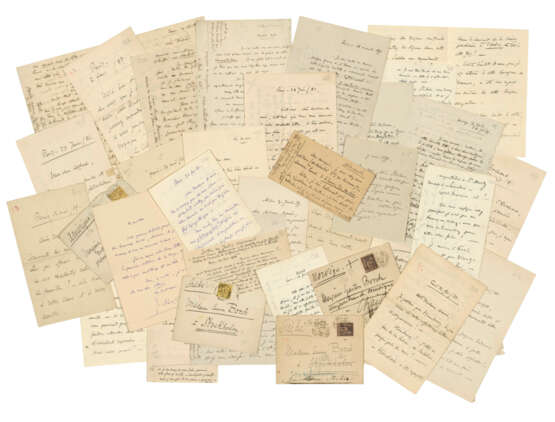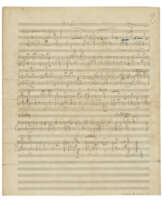ID 1109041
Lot 241 | Jules Massenet (1842-1912)
Estimate value
£ 8 000 – 12 000
c.146 autograph letters and cards signed, 1864-1910 and n.d.
Collection of approx. 146 autograph letters and cards signed, comprising 54 to Emma Borch (née Hennequin) and members of her family, 77 to the soprano Camille Borello (later as comtesse d'Artaux) and her father, ten to Campbell Clarke, and five others, 1864-1910 and n.d.
In French, various sizes. Many of the letters to Borello and Clarke with envelopes. Some with typed transcriptions and translations. Provenance: Mr F.G. Borch; Sotheby's, 15 May 1996, lot 408.
'La composition est un tyran': the busy life of an opera composer. The letters to Emma Borch and her family begin in Massenet's youth: the first is written from Rome in November 1864 while Massenet was at the French Academy after having won the Prix de Rome the previous year: it mentions work on a requiem, and a visit and an insightful dictum of Franz Liszt: 'Liszt était hier chez moi et me disait “que le musician pouvait dans ce melodies intimes, traduire jus’qu’aux sentiments les plus caches de son Coeur”'. A number of letters in 1874 discuss the studies at the Paris Conservatoire of Emma's brother, Alfred, gracefully declining to have him to stay during his studies, 'je ne puis entendre de musique et j'ai dû fuir bien des pianos !! – / La composition est un tyran – '; a generation later, the letters describe his encouragement of Emma's son, Gaston Borch, who studied at the Conservatoire under Massenet. The letters, always affectionate, refer to the whirl of Massenet's compositional activities, with rehearsals, premieres and tours constantly keeping him on the move: 'Mon opéra "Le Cid" se termine et doit être représenté dans le courant de la saison prochaine à l’opéra, à Paris cette fois! / Voilà bientôt 3 ans que je suis attelé à cette besogne & "Manon" a été un repos au milieu de cette longue occupation’ (5 June 1885); '‘je saurai dans quelques mois l’avenir certain du Cid qui, cependant, s’annonce comme un très gros succès, malgré la fureur et les malédictions des Wagnériens!’; ‘vous savez que je m’occupe d’un "Werther" et que ce travail me tient beaucoup – quel sera le résultat de tant d’heures de fièvre?’; 'je suis tellement pris par les répétitions de Werther ...' (13 November 1892). Massenet's mood fluctuates from elation to stress, and in a notable letter of 15 May 1887, deep depression: 'Je suis sans cesse triste, découragé, … au point d’en finir avec cette existence de luttes! / Si je n’avais ma fille et ma femme je ne résisterais pas …’. On 27 September 1893 he refers with equal lassitude to his current opera, Thaïs, 'J'ai fait ce que j'ai pu et le résultat m'importe peu'. In the last letter of the series, to Emma's husband after her death, he refers to her as a 'unique modèle de courage & de vertu'.
The letters to the soprano Camille Borello reflect Massenet's considerable efforts to foster the earliest years of her singing career, in 1898-1901, in one of the earliest (24 September 1898) encouraging her to work on the roles of Manon, Mignon and Sophia in Werther, thereafter often writing with letters of recommendation, introductions, arranging meetings or tickets for performances, commiserating when prospective engagements fall through ('Ah, le théâtre!'), and congratulating her when success finally arrives. The letters to Campbell Clarke introduce him in May 1884 to the French soprano Anna Soubre, and in January 1888 give him the Paris address of the American soprano Sibyl Sanderson, the object of Massenet's adoration at the time. A letter of 25 January 1887 expresses deep regret that the premiere of Biblis prevents him from meeting Joseph Joachim, 'un grand artiste! et un vrai musicien'.
Massenet's friendship with the Hennequin family dated from 1859, when as a 17-year old he stayed with them at their lodging house in Guînes: his friendship with Emma was evidently of a romantic nature initially, and he refers to her in the letter of 1864 to her mother as 'ma fiancée', but later letters after their respective marriages remain highly affectionate, as are those to or about her mother. The family was evidently highly musical: Emma was a soprano, her brother studied music, and her son, Gaston Borch (1871-1926) became well known as a composer and conductor, spending parts of his career in the USA.
| Artist: | Jules Massenet (1842 - 1912) |
|---|---|
| Place of origin: | France |
| Artist: | Jules Massenet (1842 - 1912) |
|---|---|
| Place of origin: | France |
| Address of auction |
CHRISTIE'S 8 King Street, St. James's SW1Y 6QT London United Kingdom | |||||
|---|---|---|---|---|---|---|
| Preview |
| |||||
| Phone | +44 (0)20 7839 9060 | |||||
| Buyer Premium | see on Website | |||||
| Conditions of purchase | Conditions of purchase |





